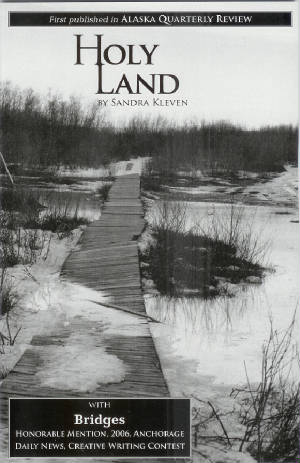
|

|
 |
 |
HOLY LAND
Pages: 42 Published:
2006
Publisher: Sandra Kleven,
A Yup’ik Alaskan
reluctantly reaches out for connection with those “from away”. He prophesies
that the bond between his people and the southerners whose time in Alaska seems
fleeting, will endure. The big question is what the southerners will choose to
learn.
Initially developed as a
monologue, Holy Land is an important narrative poem in which
the voice of an Alaskan Yup’ik man by turns pleads, challenges, disturbs,
beguiles and, ultimately, compels the listener to listen to a story which the
narrator isn’t even sure he wants to tell. The monologue turns into a dialogue
as the reader is imagined to be answering back.
Think of the wise,
ancient storyteller around the campfire. Think of the unwelcome guest at the
wedding in the Rhyme of the Ancient Mariner but add the guest’s perception that
he has embarrassed or inconvenienced you. Think of the person you know who
always seem to see through you despite your best efforts and intentions to put
your best foot forward. Even though that person makes you uncomfortable, you
can’t quite dismiss them because they know you. Think of this and you know the
Yup’ik man.
Through his
narrative, we learn of ourselves, southerners (called Gussaqs) who come for a
time, maybe 3 years, maybe fifteen, but who inevitably go away. We are invited
to contrast our tourist time in the north with the experience of the native
Alaskans who are in it for the long haul – over 10,000 years.
The Yup’ik man knows that
when we inevitably return, intrigued and answering some kind of call, we will
wear our knowledge or lack transparently. He promises he will know if we have
learned. He promises, “I will reach for those places touched by my stories… I
will reclaim parts of you that belong now to us… I will find the mark I left on
you. And you will welcome the bold intrusion. You will listen to me.”
Even if you’ve never been
to Alaska you will recognize the Yup’ik’s pain of being treated as a tourist
attraction, a curiosity or as one who is different. And reluctantly, you will
relate to his audience.
Sandra Kleven is an
exciting talent who speaks with a voice that will not be stilled. Her words
evoke the pain of abandonment and betrayal and challenge us to grow. This
narrative really made me pay attention. I felt recognized and I listened. - Esther
Ewing- The Change Alliance – New York City
|
|
 |
 |
|

|

|


